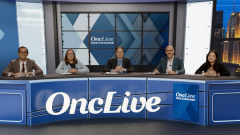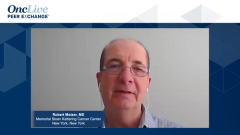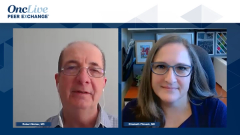
Renal Cell Carcinoma: Future Evolutions in Care
Shared insight on the evolving state of renal cell carcinoma management and hope for future growth in the treatment landscape.
Episodes in this series

Transcript:
Brian I. Rini, MD:We’re going to end this time. Thank you all for your time and expertise. [Dr Bastos], I’m going to start with you. Tell me, what are you most excited about in kidney cancer [treatments]? [It] could be a drug, it could be an approach, it could be anything.
Bruno R. Bastos, MD: Well, I think as we discuss ways to improve immune checkpoint inhibitors, [it] is very important to understand mechanisms of resistance. One thing that’s very interesting for me, and that’s something that we did a few clinical trials with a drug that targets cancer cell metabolism, is for instance in this particular case, FH-deficient [cases]. They tend to have more glycolytic pano, the cancer cells tend to survive more glycolytic pano, and that shift from glycolysis to others, metabolism in cancer cells may lead to apoptosis.
Brian I. Rini, MD:Metabolism-directed drugs.
Bruno R. Bastos, MD: Metabolism-directed drugs seem [effective], obviously in cases like FH-deficient tumors, but they may also be extended toward the renal cells.
Brian I. Rini, MD:[Dr Plimack]?
Elizabeth Plimack, MD, MS: I think if we take a step back from all these data, it’s kind of amazing how many folks are living beyond 5 years, right? We could not have imagined this, I think, when we started these studies. So that I’m just excited to see, and I think as we cross-compare and decide which is better, they’re all really great compared to where we were before. I am going to pick, as the thing I’m most excited for, trying to understand where the options are for de-escalation. We talked about stopping pembrolizumab, when to do it, who can be sequenced vs combination as we move toward triplets. It’s in way easier to answer that question because you just do the study and load them up up front and then compare, but really [what] you want to know is that overall survival. Can we achieve the same thing with sequence, with less, with breaks, with treatment-free survival? And it’s a hard question to answer, but I hope we can put a lens on that going forward now that we have the luxury.
Brian I. Rini, MD:De-escalation strategy, deintensification strategies. I’m doing like the two-word summary of each of your answers. [Dr Jonasch], what do you think?
Eric Jonasch, MD: On top of tuning the immune system, I think one of the other things that’s striking, I did my board renewal and I saw that all of the other diseases have antibody-drug conjugates [ADCs] or something where we know we have CA 19-9 [cancer antigen], we have CD70. We need to figure out what is it that we want to deliver, what’s the lethal payload that’s appropriate for renal cell carcinoma? How do we take advantage of this? We now have imaging modalities, the zirconium-89, girentuximab. That tells us we can get stuff there. We need to figure out what it is we want to get there.
Brian I. Rini, MD:So ADCs. [Dr Berg].
Stephanie A. Berg, DO: I would say, I think it’s about precision medicine. I think your work, [Dr Rini], that you’re doing with biomarker development and developing signatures, how can we best identify patients for some therapies? And really looking at our trials, getting that blood that our patients gave for the studies, analyzing it and seeing what we can do with that data and really presenting that and trying to find better ways and what we can build upon. Because there are a lot of great studies that are coming out for biomarkers-selected therapy, which a lot of other tumors look at. I think if we can incorporate that, other than the IMDC [International Metastatic RCC Database Consortium] risk, that would be really important.
Brian I. Rini, MD:Thank you. These are all great answers. Really good answers.
Elizabeth Plimack, MD, MS: How about you, [Dr Rini]?
Brian I. Rini, MD:I would say, yeah, biomarkers of course, but I might say, I think we’re about to see a wave of novel immune drugs, novel non PD-1, PD-L1 base, be it LAG-3 or TIGIT or novel CTLA-4, those novel CTLA-4 drugs. And I think we’re going to start to see those develop, see them combined in the front line, and I think we’re going to cure more patients. On that note, thanks again to our panel, this was great. And thanks to our viewing audience. Thanks for joining us. We hope you found this OncLive® Peer Exchange discussion to be useful and valuable for the treatment of your patients with advanced kidney cancer.
Transcript edited for clarity.











































